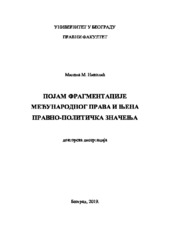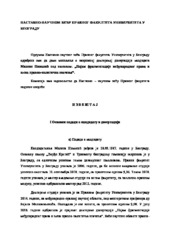Приказ основних података о дисертацији
Појам фрагментације међународног права и њена правно-политичка значења
The concept of frangmentation of international law and its legal and political meanings
| dc.contributor.advisor | Milisavljević, Bojan | |
| dc.creator | Nikolić, Milena M. | |
| dc.date.accessioned | 2020-09-25T15:01:50Z | |
| dc.date.available | 2020-09-25T15:01:50Z | |
| dc.date.issued | 2020-07-09 | |
| dc.identifier.uri | http://eteze.bg.ac.rs/application/showtheses?thesesId=7584 | |
| dc.identifier.uri | https://fedorabg.bg.ac.rs/fedora/get/o:22510/bdef:Content/download | |
| dc.identifier.uri | http://vbs.rs/scripts/cobiss?command=DISPLAY&base=70036&RID=20805897 | |
| dc.identifier.uri | https://nardus.mpn.gov.rs/handle/123456789/17427 | |
| dc.description.abstract | Централни предмет истраживања предложене докторске дисертације је проучавање феномена фрагментације у међународном праву, у најширем смислу, њеног утицаја на различите гране општег међународног права, као и проучавање ефеката и значења која фрагментација достиже у правно-политичком контексту. Овако дефинисан предмет спада у област међународног јавног права, а мањим сегментима задире и у области међународних људских права, као и међународног кривичног права. Проблем фрагментисаног међународног система је актуелно питање, о чему сведочи и рад Комисије УН за међународно право и њен извештај о фрагментацији. Истраживање у овом раду се базира на две основне хипотезе. Иако се фрагментација у литератури најчешће посматра као негативна појава, у првој хипотези ћемо показати да она није сама по себи, суштински, позитивна или негативна, већ да се њене одлике могу посматрати само у корелацији са конкретним случајем, као и са другим процесима и појавама. Међународно право се састоји од различитих парцијалних система како универзалних, тако регионалних и билатералних, где су сви различитих нивоа правне интеграције. Овакве карактеристике доводе до извесних контрадикторности. Недостатак јасних правних упутстава за решавање сукоба норми који је један од узрока фрагментације није својствен само систему међународног права, већ се може препознати и у унутрашњем праву држава, али и у оквиру рада једног судског органа. Међународни систем права је фрагментисан, међутим фрагментација сама по себи није искључиво нуспојава која нарушава јединство међународног система. | sr |
| dc.description.abstract | The central research subject of the proposed doctoral dissertation is the study of the phenomenon of international law fragmentation, in the broadest sense, its impact on various branches of general international law, as well as the study of effects and meanings of fragmentation in the legal and political context. The subject thus defined belongs to the field of public international law, and its smaller segments fall within the field of international human rights and international criminal law. The problem of fragmented international system is becoming increasingly topical, as evidenced by the work of the UN International Law Commission and its fragmentation report. The research presented in this paper is based on two basic hypotheses. Although the fragmentation in the literature is most often seen as a negative phenomenon, in the first hypothesis we will demonstrate that, in its essence, the fragmentation is not inherently positive or inherently negative, but that its features can only be seen in correlation with a particular case, as well as with other processes and phenomena. International law consists of different partial systems, universal as well as regional and bilateral, each having a different level of legal integration. Such characteristics lead to some contradictions. The lack of clear legal guidance on resolving conflicts of norms, which is one of the causes of fragmentation, is not only inherent to the system of international law, but can also be recognized in the internal law of states and within the work of a judicial body. International law system is fragmented, however, the fragmentation itself is not only a side effect that undermines the unity of the international system. Fragmentation, as a phenomenon exclusively discussed within the international legal system, also manifests its basic characteristics in completely closed systems of law. It has never been denied that, even within a single judicial body, different chambers in the same situations may apply different rules of international law, contributing quantitatively to case law. The author will make special efforts to prove that such quantity is often accompanied by quality, when it comes to diversification of case law. We will demonstrate that the proliferation of international courts and tribunals leads to legal inequality and uncertainty, which is why the international legal system cannot avoid normative conflicts and incoherence. | en |
| dc.format | application/pdf | |
| dc.language | sr | |
| dc.publisher | Универзитет у Београду, Правни факултет | sr |
| dc.rights | openAccess | en |
| dc.source | Универзитет у Београду | sr |
| dc.subject | фрагментација међународног права | sr |
| dc.subject | fragmentation of international law | en |
| dc.subject | proliferation of international courts and tribunals | en |
| dc.subject | coherence | en |
| dc.subject | diversification | en |
| dc.subject | self-contained regimes | en |
| dc.subject | UN International Law Commission | en |
| dc.subject | hierarchy of international law | en |
| dc.subject | International Court of Justice. | en |
| dc.subject | пролиферација међународних судова и трибунала | sr |
| dc.subject | кохерентност | sr |
| dc.subject | диверзификација | sr |
| dc.subject | самостални правни режими | sr |
| dc.subject | Комисија УН за међународно право | sr |
| dc.subject | хијерархија међународног права | sr |
| dc.subject | Међународни суд правде. | sr |
| dc.title | Појам фрагментације међународног права и њена правно-политичка значења | sr |
| dc.title.alternative | The concept of frangmentation of international law and its legal and political meanings | en |
| dc.type | doctoralThesis | en |
| dc.identifier.fulltext | https://nardus.mpn.gov.rs/bitstream/id/65441/IzvestajKomisije23252.pdf | |
| dc.identifier.fulltext | https://nardus.mpn.gov.rs/bitstream/id/65440/Disertacija.pdf | |
| dc.identifier.rcub | https://hdl.handle.net/21.15107/rcub_nardus_17427 |



